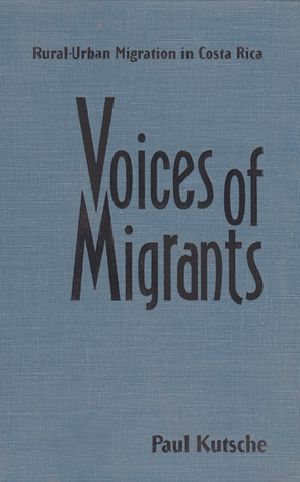Voices of Migrants · Rural-Urban Migration in Costa Rica

- Authors
- Kutsche, Paul
- Publisher
- University Press of Florida
- Tags
- test
- ISBN
- 9780813012667
- Date
- 1994-02-20T00:00:00+00:00
- Size
- 0.54 MB
- Lang
- en
"Examining migration through life histories puts flesh on analytical bones. . . . Kutsche is an astute interviewer with a real capacity to establish rapport with his informants. . . . Nothing like this book exists in the Latin American migration literature."--Leigh Binford, University of Connecticut
"Chico" and "Beto" came to San José ignorant of city life and now contemplate returning to their homes in rural Costa Rica; "El Negro" forges a modest, solid life in the city; "El Visionario" lives out a romantic dream but participates in the political life of his squatter settlement; "Primitiva" seems indifferent to her surroundings; "El Viejo" came to the city to educate his children and retire.
Their stories, six of the fourteen male and female life histories Paul Kutsche presents, emphasize the psychic costs of migration and reveal the personal characteristics that correlate with success or failure in moving from the country to the city. Like Oscar Lewis's Children of Sanchez , this book puts a face on the phenomenon of migration. Kutsche follows the tape-recorded interviews (which he translated from Spanish into English) into channels dictated by his subjects, giving them freedom to construct their own lives, interested as much in the construction as in its veracity.
Kutsche begins with a brief history of Costa Rica that examines the roles of agriculture, economics, politics, and the environment in creating the conditions for rural-urban migration; he concludes that people with lower aspirations about migration have a higher rate of success.
While Costa Rica appears to be atypical of other Central American countries--more peaceful, more friendly, and more open to foreigners--Kutsche concludes that what is happening in San Jose "differs little from the same process elsewhere in what optimists like to call 'developing' countries. . . . I do not see the Third World catching up to industrialized areas within any scenario short of turning the relations of power totally upside down." Putting a face on the process of migration may enlighten readers in English-speaking countries "where the economic decisions are made that shape the cities of the Third World."
Paul Kutsche is professor emeritus of anthropology at Colorado College. He is the coauthor of Canones: Values, Crisis and Survival in a Northern New Mexican Village and the editor of Survival of Spanish American Villages , and he has written numerous articles and reviews for professional journals.